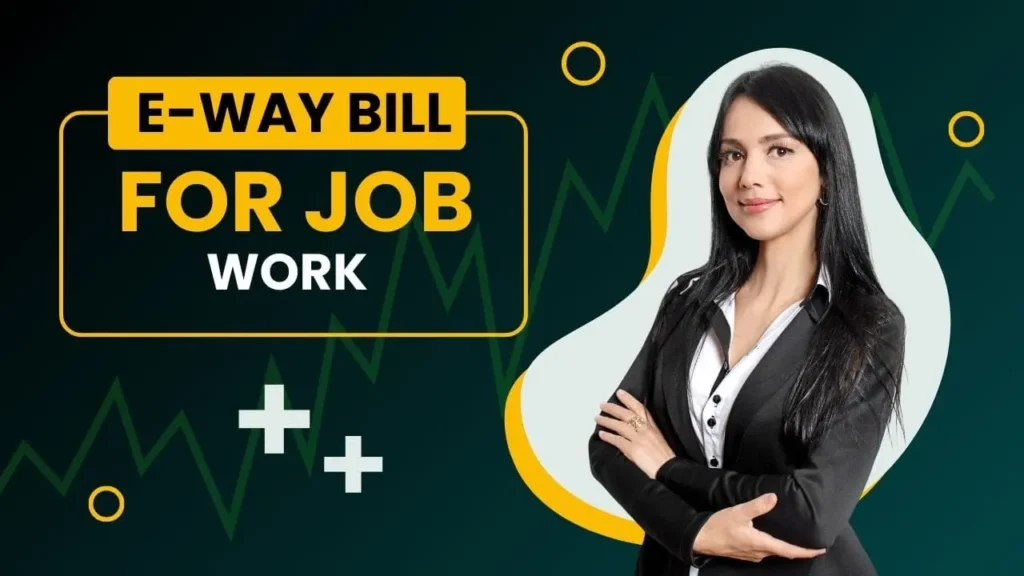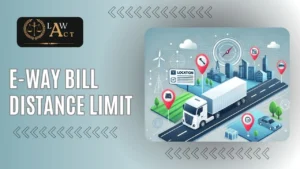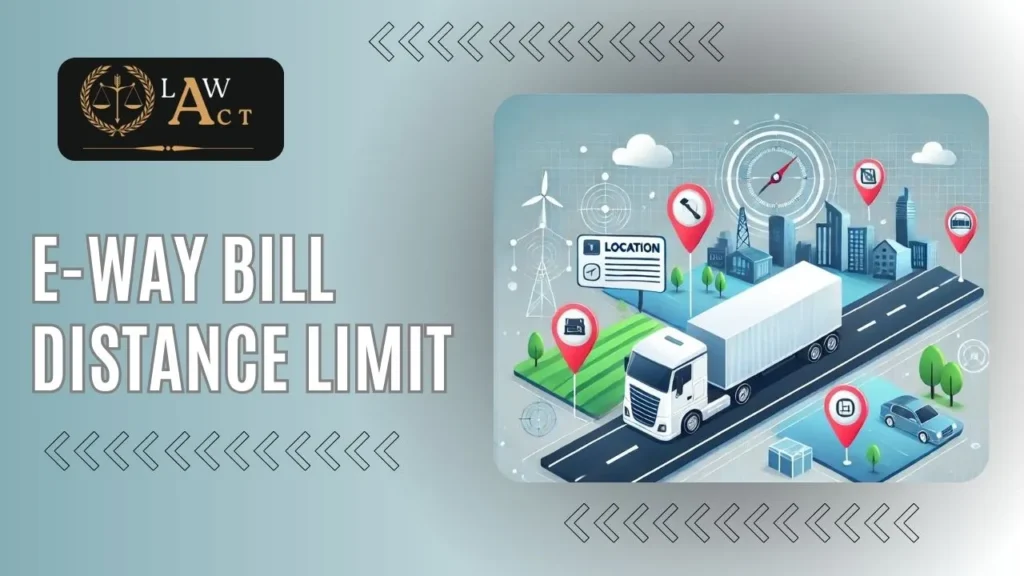If you are a manufacturer, job worker, or businessman, you might already be aware of the e-way bill system under the GST regime. For instance, the movement of goods worth a specified amount requires an e-way bill, which is one of the enforcement tools to monitor the movement of goods in transit. When it is job work where goods are sent for specialized tasks like painting, machining or assembly, the procedure has specific regulations. This article will help you understand how e-way bills apply to job work, how compliance can be made, penalties for non-compliance and some practical tips that will help streamline the procedure.
What is Job Work?
Job work is any kind of process or treatment of goods, whether the execution of this process or treatment is undertaken on an installing basis at one place or otherwise, is made, supplied, processed, printed or in any manner dealt with by a job worker on behalf of a principal manufacturer. Such goods are normally returned to the principal after the job work is done. Typical examples of job work are the textile, metal and electronics industries.

What is an E-Way Bill?
An e-way bill is an electronic document that would be required to carry any goods whose value exceeds ₹50,000. It carries information regarding the sender, the recipient, the value of goods, and the mode of transport. This will make goods accountable and transparent so that the authorities will be able to track transport as well as reduce tax evasion.
Compliance Requirements for E-Way Bill in Job Work
The rules governing e-way bills in job work are simple but need to be followed. Here is a breakdown of key compliance requirements:
| Criteria | Details |
| Value Threshold | E-way bill is required if the value of goods exceeds ₹50,000 |
| Who Generates the Bill? | Principal Manufacturer (typically) |
| Transporter Details | Mandatory in Part B if transport is handled by a third party |
| Return of Goods | A new e-way bill is required when goods are returned after job work |
Also Read: E-way Bill Distance Limit
When Should You Generate an E-Way Bill?
- Sending Goods for Job Work: Generally, the e-way bill is generated by the principal manufacturer when his goods are being sent to some other place for job work. However, if such goods are inter-state, then whose GST registration is applied to the jurisdiction would depend on either the principal or the job worker.
- Return of Goods after Job Work: When the job work is completed and goods are returned. In case the return of goods is happening in another state, the job worker needs to provide a new e-way bill.
- Interstate Transport: When consignment or return of goods happens inter-state, crossing the borders between different states, the e-way bill will be applicable, without any reference to the value of goods.

Who Should Generate the E-Way Bill?
In some cases, the liability of creating the e-way bill will be on the movement of goods while, in some other cases, the liability will be subjected to entities. Here’s a table with scenarios:
| Movement Type | E-Way Bill Responsibility |
| Principal Manufacturer sends goods to Job Worker | Principal Manufacturer generates the e-way bill |
| Job Worker returns goods to Principal (intra-state) | Principal Manufacturer generates the bill |
| Job Worker returns goods to Principal (interstate) | Job Worker generates the bill |
Process of Generating an E-Way Bill
The process of creating an e-way bill is really simple if followed in the following steps:
- Log into the GST Portal: Go to the e-way bill portal at ewaybillgst.gov.in. Log in with your credentials.
- Enter Required Details: Input details with the consignor, consignee, value of the goods and GSTIN.
- Fill Part A and Part B:
- Part A involves description and, quantity, value, and GST rates of the goods.
- Part B requires transporter details if you’re using third-party logistics for the goods movement.
- Generate the Bill: Once all details are entered, click “Generate,” and your e-way bill will be issued with a unique EBN (E-Way Bill Number).
Practical Example
Let’s consider an example of a principal manufacturer in Maharashtra, which is sending goods worth ₹1,00,000 to a job worker in Karnataka for assembling the same. In such a case, a principal has to raise an e-way bill before the goods move out of the state of Maharashtra and shall include the details of the transporter in Part B. Once the job worker completes his assembling work, if he sends the goods to Maharashtra, he will again have to raise a new e-way bill for the return journey as that is an interstate movement.
Penalties for Non-Compliance
Failure to produce an e-way bill can lead to heavy penalties under the GST Act:
- Fines: Imposition may be upon an amount equal to the amount of tax evaded or Rs 10,000, whichever is higher.
- Goods Confiscation: In such a case, the authorities can seize or confiscate the goods if they are being transported without an e-way bill.
- Imprisonment: Imprisonment is another option if serious tax evasion or repeated offences occur.
Automating the E-Way Bill Process
Most businesses are opting to automate this process of generating an e-way bill in today’s scenario, where it is becoming increasingly complex and stringent on compliance requirements. It not only reduces manual error but also saves time with all checks for compliance in place. Here is what you can do to make your process smoother:
- Integrate with ERP Systems: your ERP can be synchronized with the GST portal so that automatically, e-way bills can be generated when the goods are being dispatched.
- Batch Processing: Create multiple e-way bills together in case you have to dispatch items to various job workers or receive them from different places.
- Track Expiry: The validity of an e-way bill is very low, for instance, the validity of an e-way bill, if the distance covered is below 100 km is 72 hours. Through digital systems track the validity date and then renew the e-way bills even before their expiry dates.
How to generate e way bill for job work
Conclusion
The process of generating an e-way bill for job work is quite tedious and also has compliance aspects; therefore, it needs proper guidance about the rules and best practices to avoid penalties if anything goes wrong or does not align according to the act. Given these points, I’d say that the key should be knowing the latest compliance regulations, automating wherever possible, and maintaining accurate records at every step of the process.
This should be well-implanted from these guidelines to provide a proper base for dealing with e-way bills for job work issues. These instructions will ensure you are not non-compliant and, hopefully, make your operations streamlined and devoid of risks of penalties and time delays.
Also Read:
- What is an E-way Bill GST? And why do you need it?In the complex world of logistics and taxation, the E-way Bill under the GST system has become a crucial element for businesses engaged in the transportation of goods across India. It is basically a document mandated by the government to… Read more: What is an E-way Bill GST? And why do you need it?
- E-Way Bill for Job Work: A Comprehensive GuideIf you are a manufacturer, job worker, or businessman, you might already be aware of the e-way bill system under the GST regime. For instance, the movement of goods worth a specified amount requires an e-way bill, which is one… Read more: E-Way Bill for Job Work: A Comprehensive Guide
- E-way Bill Distance Limit: Everything You Need to KnowThis forms the basis of the Indian Goods and Services Tax regime, which has its key component as the E-way Bill system for easy transportation of goods from one state to another with a minimum number of opportunities for tax… Read more: E-way Bill Distance Limit: Everything You Need to Know
- Blocked e-Way Bill Holding You Back?The e-Way Bill system is a crucial factor for the smooth flow of commodities in India. However, in certain situations, the GST rules will block an e-Way Bill even though an error did not originate from the physical movement of… Read more: Blocked e-Way Bill Holding You Back?
Frequently asked questions
What is an E-Way Bill? Why do we need it for job work?
E-way bill refers to the electronic document that has to be issued when the consignment is ₹50,000 or more. As far as job work is considered where goods are being sent to a job worker for some processing or treatment, here also e-way bill ensures that movement shall be tracked and so also compliance with GST.
Who will generate the e-way bill in case of job work?
In general, the principal manufacturer creating consignment for job work will generate the e-way bill, but if the goods are transported across different states after some job work has been done, then it is the job worker who might need to generate the bill.
Do I need to generate a separate e-way bill when returning goods after job work?
Yes, an independent e-way bill is required in case of return to the principal after job work, more so if interstate.
Is an e-way bill required to be produced in case the value of goods is less than ₹50,000?
An e-way bill is required only when the value of the goods being transported is more than ₹50,000. However, in some states or situations, even goods of lesser value would require an e-way bill. Therefore, always check the local requirements.
What are the penal consequences if I do not generate an e-way bill for job work?
It will attract penalties like detention of goods or both. The Penalty could be a tax amount evaded or ₹ 10,000 whichever is higher. Even most of the repeated offences will also end up in imprisonment.
How can I make the e-way bill process easier for my business?
The process of creating an e-way bill is thus automated using ERP software, which enables the data to go directly to the GST portal and thereby automate generating e-way bills and eliminating any potential human error. In addition, consolidating shipments into one e-way bill further reduces the compliance workload for you.
How long is an e-way bill valid for?
An e-way bill depends upon the distance to be covered as validity. An e-way bill is valid for one day for distances covered up to 100 km and adds one more day of validity for distances beyond 100 km.
What information is required to generate an e-way bill?
The process to generate an e-way bill would include information relating to the GSTIN of the consignor and consignee, a description of the goods, the value of the consignment, and transport details if transporting through a third-party transporter.
Can a job worker, too, raise a generation of e-way bills on the movement of goods?
Yes, if the job worker is moving a consignment across inter-state borders, or he is registered under GST, then he can make sure that he gets an e-way bill for the conveyance of goods.
What would happen in case my e-way bill expires before the delivery of the goods?
A loaded e-way bill expires while the goods are still in transit, and you will need to create an e-way bill again. You should monitor its validity and renew it if its transportation is delayed.







